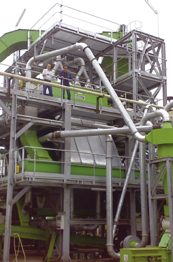A clean screen
6 October 2008In order to facilitate the use of recycled wood as a raw material for its particleboard production, Gruppo Trombini has installed a ClassiCleaner screening and cleaning system from Dieffenbacher.
The system was started up at the Annovati production line in Frossasco in September 2007, making it the first ClassiCleaner installation in Italy.
In line with the industry’s trend to switch to the use of recycled raw materials, such as construction waste or old furniture, Finland-based Dieffenbacher Panelboard Oy has developed a solution which combines screening and cleaning into one single unit.
Dieffenbacher claims that the ClassiCleaner eliminates over 90% of all impurities, enabling high quality end product from low quality raw material.
The Annovati plant uses 100% urban waste to produce raw and melamine-faced particleboard. However, the mineral content in the raw material is very high, making it essential to have an efficient cleaning system at an early process stage.
“The ClassiCleaner has a totally different cleaning philosophy to any other system on the market,said Mr Sirio Menghini, plant director of the Annovati site.
The operating principle is based on fractionating: the material is first separated into different fractions, which are then enriched and finally cleaned. This method combines air cleaning with roller screening.
By classifying the material into fine, medium and coarse, the most suitable cleaning method can be used for each type of fraction, according to Dieffenbacher. This is said to save a great deal of energy since there is no need to pass the entire material flow through the cleaning process. In fact, the material flow introduced to the air-cleaning phase is only around 10% of the total capacity.
The modular design of the ClassiCleaner is designed to enable quick installation and start-up; at the Annovati plant, the project was successfully carried out in less than three weeks, including dismantling old screening machinery.
“The compact system is low-maintenance and simple to operate. Also, due to the efficient mineral separation, the exchange interval for screen nets in our hammer mills is three times longer than before. This not only has a positive
influence on maintenance costs, but it also improves the flake quality,said Mr Menghini.
The plant director said he is very satisfied with the performance of the ClassiCleaner cleaning system, which is designed for processing 300m3/hour.
It features a ClassiScreen roller screen with three-stage cleaning, including separating units for sand, stones and heavy particles.
The raw material is introduced onto a bed of patterned rollers where impurities are enriched to smaller contaminated sub-flows. Each of these is taken to a suitable cleaning process.
Fine and heavy impurities, such as sand, pass to air-cleaning units, while large and heavy impurities are passed to a heavy particle separator. An additional cleaning unit is installed in the system to separate foils from the material flow.
Mr Menghini said the ClassiCleaner offers the optimum combination: low energy consumption and high chip
cleaning efficiency.
“The complete ClassiCleaner installation consumes about 300kW less electrical energy than our old cleaning system. For us, this means annual savings of nearly e200,000 in energy consumption.
